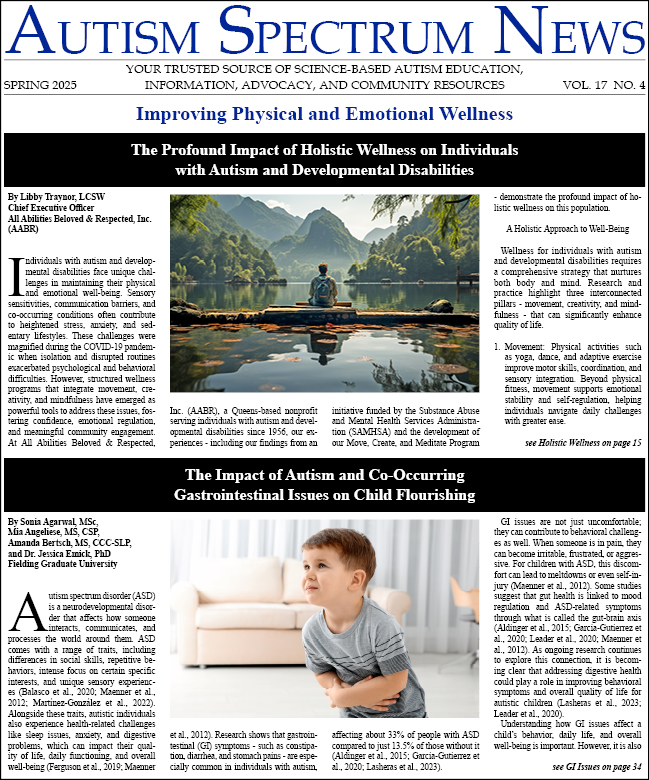-
Use Science and the Scientific Method When Considering Treatment
Autism is a spectrum disorder that varies in degree from mild to severe, with a range of needs that call for a wide array of supports. AHA/Asperger Syndrome and High Functioning Autism Association’s mission is to attain appropriate educational programs, effective social skills training, increased...
-
Computerized Health Games to Promote Social Perceptual Learning in Autism
Many individuals with autism spectrum disorders (ASD) struggle to read nonverbal social cues, such as facial expressions, and often have difficulty recognizing a person's identity from their face. New computerized video games being developed by the Center for Autism Research (CAR) at The...
-
Assisting Parents in the Struggle to Access Science-Based Information and Treatments for their Children with ASD
Families of children who receive a diagnosis of an autism spectrum disorder (ASD) are faced with profound challenges, and many feel a tremendous burden (Mulligan, Steel, Macculloch & Nicholas, 2010). The time of diagnosis may represent a pivotal point for both the child and the individuals...
-
The Importance of Skepticism in Evaluating Claims, Selecting Treatments, and Enhancing Science-Based Treatment for Autism
The ivory-billed woodpecker (Campephilus principalis) was last known to exist in 1944. Unexpectedly, in 2004, it was purportedly seen near Brinkley, Arkansas. This claim resulted in a scientific expedition that produced an inconclusive video that was used to confirm the bird’s reemergence from...
-
Employment and People with Disabilities: A Social Ill to Change, Not Manage
During the last twenty-five years there has been a cataclysmic shift in the employment world of Americans. The fundamental shift and loss of the manufacturing base in America impacted not only the middle working class but also those individuals with disabilities who would have had a more secure...
-
The Ritvo Autism Asperger Diagnostic Scale-Revised (RAADS-R)
A Scale to Assist the Diagnosis of Autistic Disorder in Adults 18 Years and Older The RAADS-R is an eighty item scale specifically designed to assist clinicians diagnosing Autistic Disorder (AD) in adults eighteen years and older. It contains a total of eighty questions. Sixty-four short...
-
Funding the Special Needs Trust
Parents or guardians of a dependent with special needs are likely to be familiar with the legal document commonly known as the special needs trust. With the help of an attorney who has expertise in this area, they’ve come to understand that the purpose of the special needs trust is to provide...
-
Parent Voices Drove Autism Certification Standards
It was a VERY troubling message” says Paul Andrew, remembering what he heard from a group of autism parents, advocates, and providers about the state of social services for people with autism in 2005. And it moved him to action. As Managing Director of Community Services for the accrediting...
-
Social Coping and Autism Spectrum Disorders: The Power Combination of Psychology and Speech Language Interventions
Throughout our years working with the ASD population, parents often inquire about whether their child should be receiving speech-language or psychological services. The answer is frequently “both.” Research demonstrates that individuals with ASDs are at great risk for developing significant...
-
A Look Inside the Hidden Curriculum
The hidden curriculum is assumed knowledge - the expectations, rules or guidelines that are not directly taught because they are universally known (Garnet, 1984; Hemmings, 2000; Jackson, 1968; Kanpol, 1989; Myles, Trautman, & Schelvan, 2004). It also addresses the incongruities of how skills...




